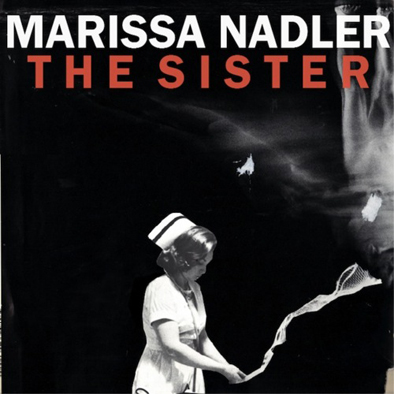 Last year's self-titled, self-released album felt like a major creative breakthrough for Nadler, as she found a very effective way for her distinctive, ghostly songs to coexist with a bit more light and life. The Sister, billed as its companion album, turns out to be something of a lateral move rather than an evolution or continuation. It is certainly more melancholy, spare, and monochromatic than I expected, but it largely overcomes those hurdles by being such a meticulously crafted, focused, concise, and thematically coherent song suite. As a whole, it is perhaps a bit weaker than some of Marissa's other efforts, but some of the individual songs are easily among her best.
Last year's self-titled, self-released album felt like a major creative breakthrough for Nadler, as she found a very effective way for her distinctive, ghostly songs to coexist with a bit more light and life. The Sister, billed as its companion album, turns out to be something of a lateral move rather than an evolution or continuation. It is certainly more melancholy, spare, and monochromatic than I expected, but it largely overcomes those hurdles by being such a meticulously crafted, focused, concise, and thematically coherent song suite. As a whole, it is perhaps a bit weaker than some of Marissa's other efforts, but some of the individual songs are easily among her best.
Despite a vague continuation of some of Marissa Nadler's lyrical themes and the return of most of the same collaborators, The Sister essentially feels like a total negative image of its predecessor.  The most significant difference is a pretty damn dramatic one, as last year's effort sounded like Nadler fronting a languorously swaying alt-country band and this basically sounds like an intimate and decidedly non-swinging solo performance.  Evidence of other musicians certainly exists, but aside from Orion Rigel Domisse's piano in "Love Again, There is a Fire" and the drums in "The Wrecking Ball Company," contributions are pretty much relegated to subtle coloration.  That is perfectly fine by me, as the melancholy, nocturnal feel of these songs is well-served by their spare, minor key arpeggio accompaniment.  The album would be a trainwreck if it was not, as Nadler only departs from her wistful acoustic arpeggiations once (on the aforementioned "Love Again," the album's weakest, most heavy-handed piece).  That is not an exaggeration at all, as she never even builds up to strumming an acoustic guitar–these are unwaveringly slow, fragile, and achingly poignant songs.  The whole thing evokes old, lonely New England houses, heartache, and moonlit nights, which is a pretty wonderful aesthetic in small doses, but could get suffocating sad and numbingly one-dimensional over the course of an entire album.  Nadler, thankfully, was self-aware enough to consider that and wisely kept The Sister to a lean half-hour.  That is the perfect length for this suite.
Of course, she was never in much danger of overstaying her welcome: despite the very specific formula and limited palette on display, Marissa's songwriting remains wonderful.  She manages to find quite a lot of room for variety within her very narrow scope.  Nearly every song boasts at least one strong hook and Nadler's singular and sensuous voice swoops hauntingly and movingly throughout.  Despite the inexplicable use of a flanger near the end, the sweetly sad "In a Little Town" is a damn near perfect song, and there are at least three or four others that reach similarly great heights (like "Apostle" and "The Wrecking Ball Company," for example).  That is a high success rate for an 8-song album.  Also, Nadler's craft goes quite a bit deeper than just melody and atmosphere, populating her songs with an enigmatic cast of characters whose stories are not immediately graspable.
I love albums with a healthy dose of mystery, as it makes repeat listening seem much more enticing than usual.  It is admittedly a bit hard for me to fully accept this as "the new Marissa Nadler album" given its brevity, narrow focus, and stylistic divergence from her last record, but it is a pretty inspired and irresistible effort regardless of how I ultimately decide to categorize it.
samples:
 
Read More


